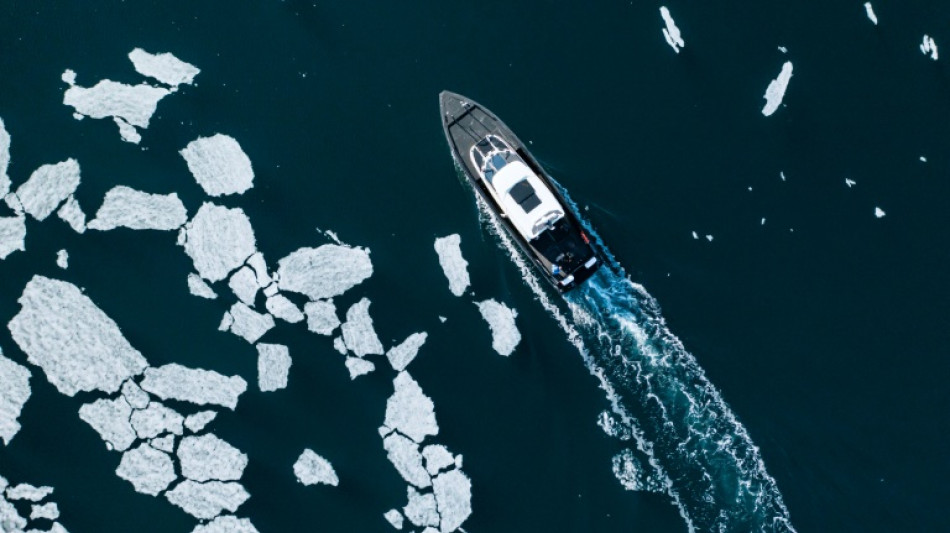
-
 Navarrete beats Suarez on technical decision to keep title
Navarrete beats Suarez on technical decision to keep title
-
Scans clear Wallabies fly-half Lolesio of serious back injury

-
 Leo XIV to address faithful with St Peter's prayer
Leo XIV to address faithful with St Peter's prayer
-
T-Wolves grab 2-1 NBA playoff series lead as Celtics get key win

-
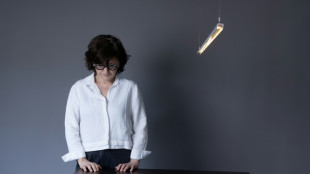 Gaza war casts shadow over Cannes film festival
Gaza war casts shadow over Cannes film festival
-
'Treasure hunt': tourists boost sales at Japan's Don Quijote stores

-
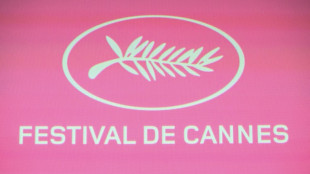 Cannes Festival: the films in competition
Cannes Festival: the films in competition
-
Cannes film festival: what to look out for
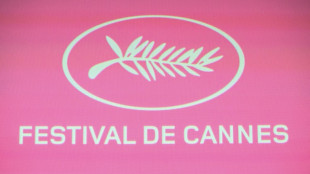
-
 Jordan hospital treats war casualties from across Middle East
Jordan hospital treats war casualties from across Middle East
-
As Trump family's Gulf empire grows, rulers seek influence, arms, tech

-
 S. Korea conservatives choose presidential candidate after last-minute chaos
S. Korea conservatives choose presidential candidate after last-minute chaos
-
Trump hails 'total reset' in US-China trade relations as talks continue
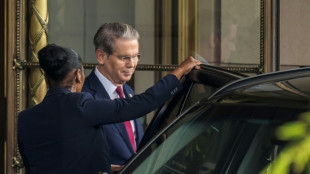
-
 Film claims to name killer of slain journalist Shireen Abu Akleh
Film claims to name killer of slain journalist Shireen Abu Akleh
-
Under Trump pressure, Columbia University ends semester in turmoil
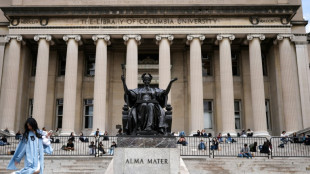
-
 Putin proposes direct Ukraine talks but quiet on 30-day ceasefire
Putin proposes direct Ukraine talks but quiet on 30-day ceasefire
-
Trump hails US-China trade 'reset' after first day of talks
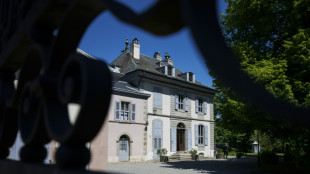
-
 Jeeno leads Boutier by one at LPGA Americas Open
Jeeno leads Boutier by one at LPGA Americas Open
-
Lowry, Straka share lead at windy Truist

-
 Messi suffers worst defeat in MLS as Miami fall again
Messi suffers worst defeat in MLS as Miami fall again
-
Celtics overwhelm Knicks to pull within 2-1 in NBA playoff series

-
 Toulouse crush Toulon to reach Top 14 semis as Castres pay tribute to Raisuqe
Toulouse crush Toulon to reach Top 14 semis as Castres pay tribute to Raisuqe
-
Marseille, Monaco clinch Champions League qualification from Ligue 1

-
 'One of those days': Atletico record-breaker Sorloth hits four
'One of those days': Atletico record-breaker Sorloth hits four
-
Toulouse's Ntamack suffers concussion in Top 14, Willemse nears exit

-
 Record-breaker Sorloth hits four as Atletico smash Real Sociedad
Record-breaker Sorloth hits four as Atletico smash Real Sociedad
-
'Weight off my shoulders': Bayern's Kane toasts breakthrough title

-
 Sinner grateful for 'amazing' support on Italian Open return from doping ban
Sinner grateful for 'amazing' support on Italian Open return from doping ban
-
Hamburg return to Bundesliga after seven-year absence

-
 Toulouse's Ntamack suffers concussion in Top 14 clash
Toulouse's Ntamack suffers concussion in Top 14 clash
-
India, Pakistan reach ceasefire -- but trade claims of violations

-
 'Long time coming': Bayern's Kane toasts breakthrough title
'Long time coming': Bayern's Kane toasts breakthrough title
-
US, China conclude first day of trade talks in Geneva
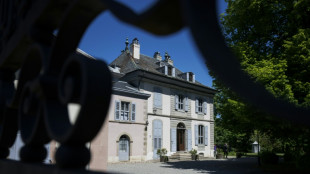
-
 Kane tastes first title as champions Bayern bid farewell to Mueller
Kane tastes first title as champions Bayern bid farewell to Mueller
-
Benfica deny Sporting to take Portuguese title race to wire

-
 Sinner makes triumphant return from doping ban at Italian Open
Sinner makes triumphant return from doping ban at Italian Open
-
Sinner wins at Italian Open in first match since doping ban
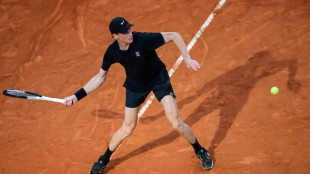
-
 Leo XIV, new pope and 'humble servant of God', visits Francis's tomb
Leo XIV, new pope and 'humble servant of God', visits Francis's tomb
-
India claims Pakistan violated truce, says it is retaliating

-
 Champions League race hots up as Man City held, Villa win
Champions League race hots up as Man City held, Villa win
-
Kane tastes first title as champions Bayern see off Mueller

-
 US envoy calls enrichment 'red line' ahead of new Iran talks
US envoy calls enrichment 'red line' ahead of new Iran talks
-
Hastoy lifts La Rochelle as Castres pay tribute to Raisuqe

-
 Southampton avoid Premier League 'worst-ever' tag with Man City draw
Southampton avoid Premier League 'worst-ever' tag with Man City draw
-
Injury forces Saints quarterback Carr to retire

-
 S.Korea conservative party reinstates candidate after day of turmoil
S.Korea conservative party reinstates candidate after day of turmoil
-
Verdict due Tuesday in Depardieu sexual assault trial

-
 Man City held by Southampton as Brentford, Brighton win
Man City held by Southampton as Brentford, Brighton win
-
Groundbreaking Cameroonian curator Kouoh dies: Cape Town art museum

-
 Leo XIV, 'humble servant of God', visits sanctuary in first papal outing
Leo XIV, 'humble servant of God', visits sanctuary in first papal outing
-
Leipzig miss Champions League as Bochum and Kiel relegated


The Arctic's tricky quest for sustainable tourism
Home to polar bears, the midnight sun and the northern lights, a Norwegian archipelago perched high in the Arctic is trying to find a way to profit from its pristine wilderness without ruining it.
The Svalbard archipelago, located 1,300 kilometres (800 miles) from the North Pole and reachable by commercial airline flights, offers visitors vast expanses of untouched nature, with majestic mountains, glaciers and frozen fjords.
Or, the fjords used to be frozen. Svalbard is now on the frontline of climate change, with the Arctic warming three times faster than the planet.
The local coal mines -- the original reason for human settlements here -- have closed one after the other over the years, and tourism has become one of the main pillars of the local economy, along with scientific research.
"It's always hard to defend because we know that tourism worldwide creates challenges to all the places people visit, but also in the bigger climate change perspective," acknowledged Ronny Brunvoll, the head of tourism board Visit Svalbard.
"But we can't stop people from travelling. We can't stop people from visiting each other, so we have to find solutions," he said.
Around 140,000 people visit these latitudes each year, according to pre-pandemic data, where 65 percent of the land is protected.
Like the 3,000 local residents, visitors must follow strict rules that bar them from disturbing the animals -- tracking a polar bear can lead to a big fine -- or picking flowers in an ecosystem almost devoid of vegetation.
"You are really confronted with nature. There are not a lot of places like this left," said Frederique Barraja, a French photographer on one of her frequent trips to the region.
"It attracts people, like all rare places. But these places remain fragile, so you have to be respectful when you visit them."
Ultra-polluting heavy fuel, commonly used by large cruise ships, has been banned in the archipelago since the start of the year, ahead of a ban to be progressively implemented across the Arctic as of 2024.
The ban may be another nail in the coffin for the controversial cruise ships that sail into the region.
The biggest of the behemoths can drop off up to 5,000 passengers in Longyearbyen, the archipelago's modest main town whose infrastructure, such as roads and toilets, is not designed to accommodate such large crowds.
- Electric wave -
With tourism here already attracting a rather exclusive clientele, some operators are going further than regulations require, such as Norwegian cruise line Hurtigruten which aims to become "the most environmental tour operator in the world".
Sustainability "shouldn't be a competitive advantage", said a senior executive with the group, Henrik Lund. "It should just give a right to play."
The company banned single-use plastics back in 2018, and now offers outings on electric snowmobiles.
It also recently launched excursions on board a small cutting-edge hybrid vessel, the Kvitbjorn (Polar Bear, in Norwegian), combining a diesel motor and electric batteries.
"In the idyllic exploration areas, we go full electric. We go silent and we don't have any combustion fumes," said Johan Inden, head of marine engine maker Volvo Penta.
But electrification efforts in the archipelago are currently hobbled by the fact that electricity comes from a coal plant -- a fossil energy source that contributes to global warming.
"Electrification makes sense, regardless of the energy source," insisted Christian Eriksen of the Norwegian environmental group Bellona.
Regardless of whether it comes from "dirty" or "clean" sources, electricity "makes it possible either way to reduce emissions," Eriksen said, citing a study on electric cars that came to the same conclusion.
Longyearbyen plans to close the plant by the autumn of 2023, invest in renewable energies and reduce its emissions by 80 percent by 2030.
But Brunvoll, the head of the tourism board, noted the main problem is travel.
"Even when addressing the things we can do locally, like the emissions from snowmobiles or cars, we must still acknowledge that the really big problem is the transport to and from Svalbard, both in tourism but also for us locals," he said.
"We have a climate footprint per capita in Longyearbyen that is insane."
A.Jones--AMWN
